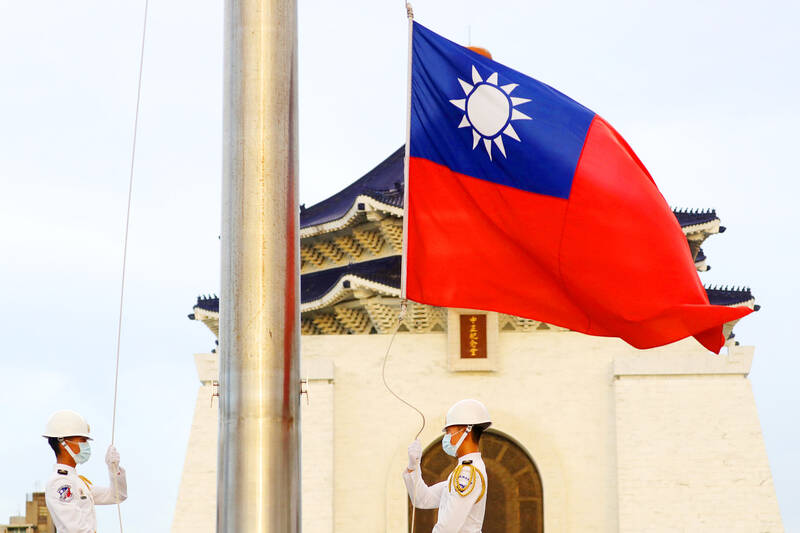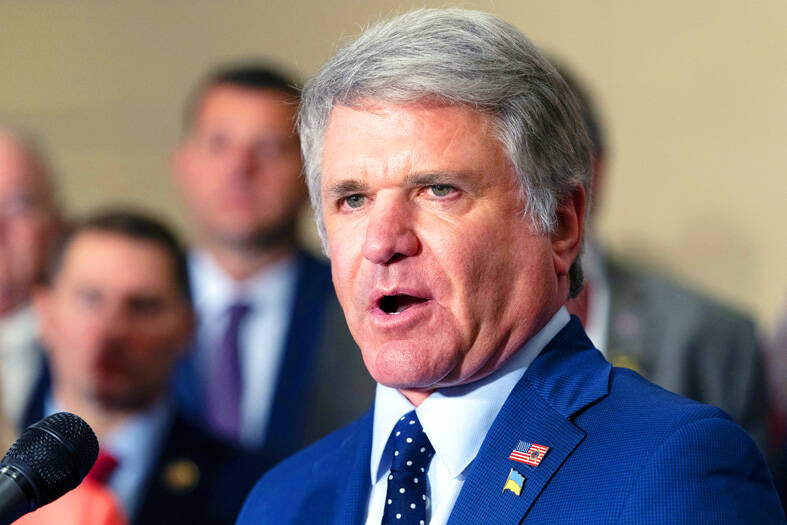US House of Representatives committees on Tuesday passed bills in support of Taiwan, including one that would require the US Department of State to make periodic reviews of ties with Taiwan to ensure that any changes in US policy toward Taiwan would help the relationship.
The House Financial Services Committee passed the Taiwan Conflict Deterrence Act, the PROTECT Taiwan Act and the Taiwan Non-Discrimination Act, while the House Foreign Affairs Committee passed the Taiwan Assurance Implementation Act, which makes the demand of the state department.
All of the bills were passed unanimously.

Photo: AFP
In a statement on Friday last week to introduce the Taiwan Assurance Implementation Act, US Representative Ann Wagner, vice chair of the Financial Services Committee, said that a decision by the administration of US President Joe Biden to reimpose restrictions on “self-imposed guidelines” governing interactions between Taiwanese and US officials “only emboldens China’s Communist Party and weakens US support for our ally Taiwan.”
“When [the US] Congress passed the Taiwan Assurance Act in 2020, we were crystal clear that the United States needed to eliminate these outdated and unnecessary restrictions on US-Taiwan engagement,” Wagner said.
The Taiwan Non-Discrimination Act would instruct the US governor of the IMF to advocate for Taiwan’s membership in the UN agency, and push the global lender to offer Taiwan technical assistance and training, and provide Taiwanese with equal employment opportunities.

Photo: Chiang Ying-ying, AP
US Representative Young Kim, the House Foreign Affairs Subcommittee on the Indo-Pacific chairwoman who sponsored the bill on non-discrimination, said: “Taiwan is one of the world’s most astonishing economic growth stories, so why wouldn’t we want its experiences to inform the work of the IMF?”
“We cannot let the People’s Republic of China [PRC] exploit countries in need and take advantage of international treaties and organizations,” said Kim, who also sponsored the People’s Republic of China is not a Developing Country Act, which was also passed.
US Representative Michael McCaul, chairman of the House Foreign Affairs Committee, said: “Make no mistake, China is not a developing country, despite the People’s Republic of China’s claims... I strongly urge the international community to terminate the PRC’s ‘developing country’ status and work with partners to do the same.”

Photo: AP
The Taiwan Conflict Deterrence Act would require the US president to publish the financial assets of top Chinese leaders, and cut them and their family members off from financial services if China were to harm US interests because of a threat it makes regarding Taiwan.
The PROTECT Taiwan Act would direct the White House to push for the exclusion of China from international organizations, including the G20 and the Bank of International Settlements in the event of “any threat to the security or the social or economic system” of the people of Taiwan.
The finance committee also passed a resolution to demand that Beijing release Mark Swidan, a US citizen and businessman who has been detained in China since 2012.

TRAGEDY STRIKES TAIPEI: The suspect died after falling off a building after he threw smoke grenades into Taipei Main Station and went on a killing spree in Zhongshan A 27-year-old suspect allegedly threw smoke grenades in Taipei Main Station and then proceeded to Zhongshan MRT Station in a random killing spree that resulted in the death of the suspect and two other civilians, and seven injured, including one in critical condition, as of press time last night. The suspect, identified as a man surnamed Chang Wen (張文), allegedly began the attack at Taipei Main Station, the Taipei Fire Department said, adding that it received a report at 5:24pm that smoke grenades had been thrown in the station. One man in his 50s was rushed to hospital after a cardiac arrest

A car bomb killed a senior Russian general in southern Moscow yesterday morning, the latest high-profile army figure to be blown up in a blast that came just hours after Russian and Ukrainian delegates held separate talks in Miami on a plan to end the war. Kyiv has not commented on the incident, but Russian investigators said they were probing whether the blast was “linked” to “Ukrainian special forces.” The attack was similar to other assassinations of generals and pro-war figures that have either been claimed, or are widely believed to have been orchestrated, by Ukraine. Russian Lieutenant General Fanil Sarvarov, 56, head

SAFETY FIRST: Double the number of police were deployed at the Taipei Marathon, while other cities released plans to bolster public event safety Authorities across Taiwan have stepped up security measures ahead of Christmas and New Year events, following a knife and smoke bomb attack in Taipei on Friday that left four people dead and 11 injured. In a bid to prevent potential copycat incidents, police deployments have been expanded for large gatherings, transport hubs, and other crowded public spaces, according to official statements from police and city authorities. Taipei Mayor Chiang Wan-an (蔣萬安) said the city has “comprehensively raised security readiness” in crowded areas, increased police deployments with armed officers, and intensified patrols during weekends and nighttime hours. For large-scale events, security checkpoints and explosives

PUBLIC SAFETY: The premier said that security would be tightened in transport hubs, while President Lai commended the public for their bravery The government is to deploy more police, including rapid response units, in crowded public areas to ensure a swift response to any threats, President William Lai (賴清德) said yesterday after a knife attack killed three people and injured 11 in Taipei the previous day. Lai made the remarks following a briefing by the National Police Agency on the progress of the investigation, saying that the attack underscored the importance of cooperation in public security between the central and local governments. The attack unfolded in the early evening on Friday around Taipei Main Station’s M7 exit and later near the Taipei MRT’s Zhongshan